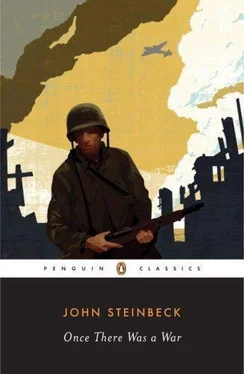John Steinbeck - Once there was a war
Здесь есть возможность читать онлайн «John Steinbeck - Once there was a war» весь текст электронной книги совершенно бесплатно (целиком полную версию без сокращений). В некоторых случаях можно слушать аудио, скачать через торрент в формате fb2 и присутствует краткое содержание. Город: New York, Год выпуска: 1960, Издательство: Bantam Books, Жанр: Классическая проза, на английском языке. Описание произведения, (предисловие) а так же отзывы посетителей доступны на портале библиотеки ЛибКат.
- Название:Once there was a war
- Автор:
- Издательство:Bantam Books
- Жанр:
- Год:1960
- Город:New York
- ISBN:нет данных
- Рейтинг книги:3 / 5. Голосов: 1
-
Избранное:Добавить в избранное
- Отзывы:
-
Ваша оценка:
- 60
- 1
- 2
- 3
- 4
- 5
Once there was a war: краткое содержание, описание и аннотация
Предлагаем к чтению аннотацию, описание, краткое содержание или предисловие (зависит от того, что написал сам автор книги «Once there was a war»). Если вы не нашли необходимую информацию о книге — напишите в комментариях, мы постараемся отыскать её.
Once there was a war — читать онлайн бесплатно полную книгу (весь текст) целиком
Ниже представлен текст книги, разбитый по страницам. Система сохранения места последней прочитанной страницы, позволяет с удобством читать онлайн бесплатно книгу «Once there was a war», без необходимости каждый раз заново искать на чём Вы остановились. Поставьте закладку, и сможете в любой момент перейти на страницу, на которой закончили чтение.
Интервал:
Закладка:
Forty paratroopers against eighty-seven Jerrys, but Jerry didn’t know that. The lieutenant also hoped Jerry wouldn’t know his guts were turned to water. His feet sounded loud on the path. It was early in the morning and the sun was not up yet. He hoped they could see his white flag. Maybe it would be invisible in this light. He kept in the open as much as possible as he climbed the hill.
He knew that the forty paratroopers were crawling and squirming behind him, keeping cover, getting into position so that if anything should go wrong they might attack and stand some chance of surprising the Jerry. He knew the fieldglasses of the captain would be on the German position, waiting for something to happen.
“If they shoot at you, flop and lie still,” the captain had said. “We’ll try to cover you and get you out.”
The lieutenant knew that if he were hit and not killed he would hear the shot after he was hit, but if he were hit in the head he wouldn’t hear or feel anything. He hoped, if it happened, it would happen that way. His feet seemed very heavy and clumsy. He looked down and saw the little stones on the path, and he wished he could get down on his knees to see what kind of stones they were. He had a positive hunger to get down out of line. His chest tingled almost as if he were preparing to receive the bullet. And his throat was as tight as it had been once when he tried to make a speech in college.
Step by step he drew nearer, and there was no sign from Jerry. The lieutenant wanted to look back to see whether any of the paratroopers were in sight, but he knew the Germans would have their fieldglasses on him, and they were close enough so that they could even see his expression.
It happened finally, quickly and naturally. He was passing a pile of rocks, when a deep voice shouted an order to him. There were three Germans, young-looking men, and they had their rifles trained on his stomach. He stopped and stared at them as they stared back. He wondered whether his eyes were as wide as theirs. They paused, and then a hoarse voice called from up ahead. The Jerries stood up and they glanced quickly down the hill before they came out to him. And then the four marched on. It seemed a little silly to the lieutenant, like little boys marching up an alley to attack Connor’s woodshed. And his bath towel on a stick seemed silly, too. He thought, Well, anyway, if they bump me our boys will get these three. In his mind’s eye he could see helmeted Americans watching the little procession through their rifle sights.
Ahead was a small white stone building, but Jerry was too smart to be in the building. A trench started behind the building and led down to a hole almost like a shell hole.
Three officers faced him in the hole. They were dressed in dusty blue and they wore the beautiful high caps of the Luftwaffe, with silver eagles and swastikas. They were electronics engineers, a ground service for the German Air Force. They faced him without speaking, and his throat was so tight that for a moment he could not begin. All he could think of was a green table; Jerry had three deuces showing and the lieutenant a pair of treys. He knew they had no more, but they didn’t know what his hole card was. He only hoped they wouldn’t know, because all he had was that pair of treys.
The Oberleutnant regarded him closely and said nothing.
“Do you speak English?” the lieutenant asked.
“Yes.”
The lieutenant took a deep breath and spoke the piece he had memorized. “The colonel’s compliments, sir. I am ordered to demand your surrender. At the end of twenty minutes the cruisers will move up and open fire unless ordered otherwise following your surrender.” He noticed the Oberleutnant’s eyes involuntarily move toward the sea. The lieutenant lapsed out of his formality, as he had planned. “What’s the good?” he said. “We’ll just kill you all. We’ve got six hundred men ashore and the cruisers are aching to take a shot at you. What’s the good of it? You’d kill some of us and we’d kill all of you. Why don’t you just stack your arms and come in?”
The Oberleutnant stared into his eyes. That what’s-in-the-hole look. The look balanced: call or toss in, call or toss in. The pause was centuries long, and then at last, “What treatment will we receive?” the Oberleutnant asked.
“Prisoners of war under Convention of The Hague.” The lieutenant was trying desperately to show nothing in his face. There was another long pause. The German breathed in deeply and his breath whistled in his nose.
“It is no dishonor to surrender to superior forces,” he said.
December 13, 1943 —
When the lieutenant went up to the Germans with his bath towel for a white flag, the captain of paratroopers, peering through a crack between two buildings, watched him go. The men hidden below saw the lieutenant challenged, and then they saw him behind the white stone building. The watching men hardly breathed then. They were waiting for the crack of a rifle shot that would mean the plan for kidding the Germans into surrender had failed. The time went slowly. Actually, it was only about fifteen minutes. Then the lieutenant appeared again, and this time he was accompanied by three German officers.
The watchers saw him walk down to a clear place in the path and there pause and point to the ground. Then two of the officers retired behind the white building again. But in a moment they reappeared, and behind them came the German soldiers. They straggled down the path and, at the place that had been indicated, they piled their arms, their rifles and machine guns, and even their pistols. The captain, lying behind his stones, watched and counted. He tallied the whole eighty-seven men who were supposed to be there. He said to his lieutenant, “By God, he pulled it off!”
And now a little pageant developed. As the Germans marched down the path, American paratroopers materialized out of the ground beside them, until they were closely surrounded by an honor guard of about thirty men. The whole group swung down the path and into the little white town that stood so high above the harbor of Ventotene.
Since Ventotene had been for hundreds of years an Italian prison island, there was no lack of place to put the prisoners. The top floor of what we would call a city hall was a big roomy jail, with four or five big cells. The column marched up the steps of the city hall and on up to the third floor, and then the Germans were split into three groups and one group was put into each of three cells, while the fourth cell was reserved for the officers. Then guards with tommy guns were posted at the doors of the cells, and the conquest was over.
The lieutenant who had carried the white flag sat down on the steps of the city hall a little shakily. The captain sat down beside him. “Any trouble?” the captain asked.
“No. It was too easy. I don’t believe it yet.” He lighted a cigarette, and his shaking hand nearly put out the match.
“Wonderful job,” the captain said. “But what are we going to do with them?”
“Won’t the ships be back tonight?”
“I hope so, but suppose they don’t get back. We can’t let anybody get any sleep until we get rid of these babies.”
A trooper lounged near. “Those Jerry officers are raising hell,” he said. “They want to see the commanding officer, sir.”
The captain stood up. “Better come with me,” he told the lieutenant. “How many men did you tell them we had?”
“Six hundred,” the lieutenant said, “and I forgot how many cruisers offshore.”
The captain laughed. “One time I heard about an officer who marched fifteen men around a house until they looked like an army. Maybe we better do that with our forty.”
At the door of the officers’ cell the captain took out his pistol and handed it to one of the guards. “Leave the door open and keep your eye on us all the time. If they make a suspicious move, shoot them!”
Читать дальшеИнтервал:
Закладка:
Похожие книги на «Once there was a war»
Представляем Вашему вниманию похожие книги на «Once there was a war» списком для выбора. Мы отобрали схожую по названию и смыслу литературу в надежде предоставить читателям больше вариантов отыскать новые, интересные, ещё непрочитанные произведения.
Обсуждение, отзывы о книге «Once there was a war» и просто собственные мнения читателей. Оставьте ваши комментарии, напишите, что Вы думаете о произведении, его смысле или главных героях. Укажите что конкретно понравилось, а что нет, и почему Вы так считаете.









